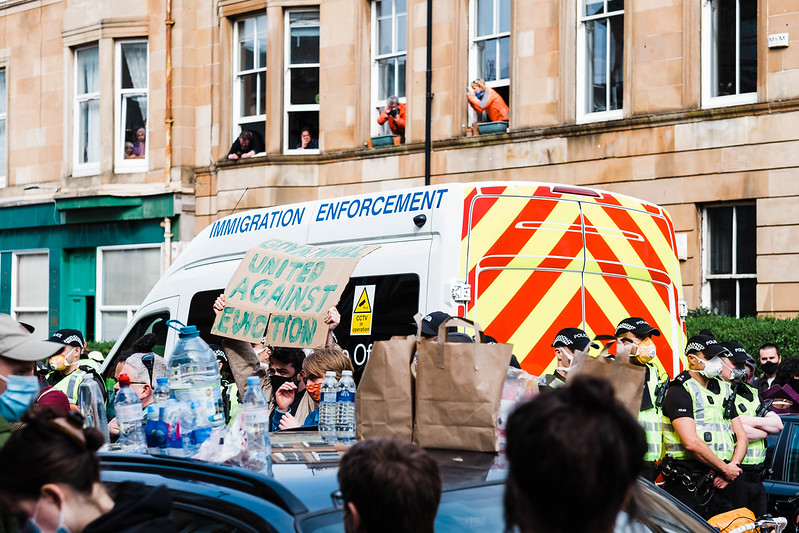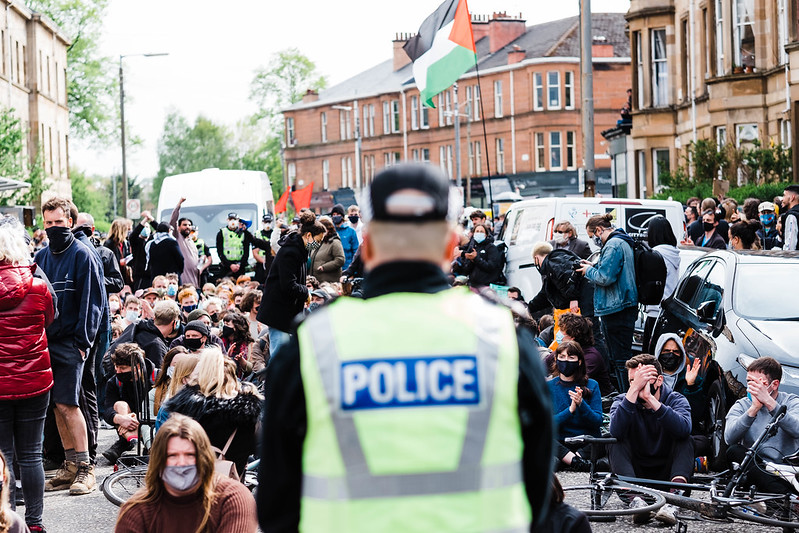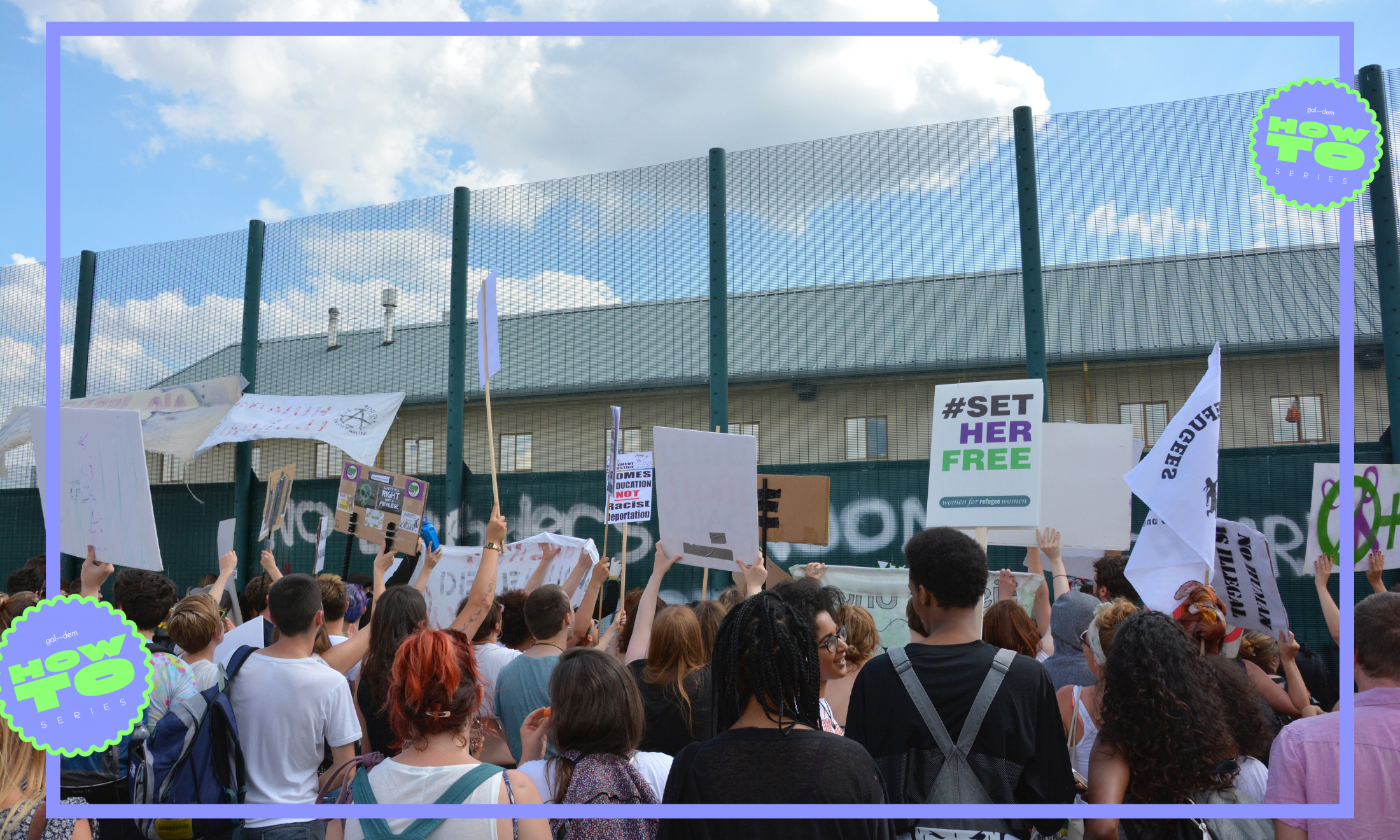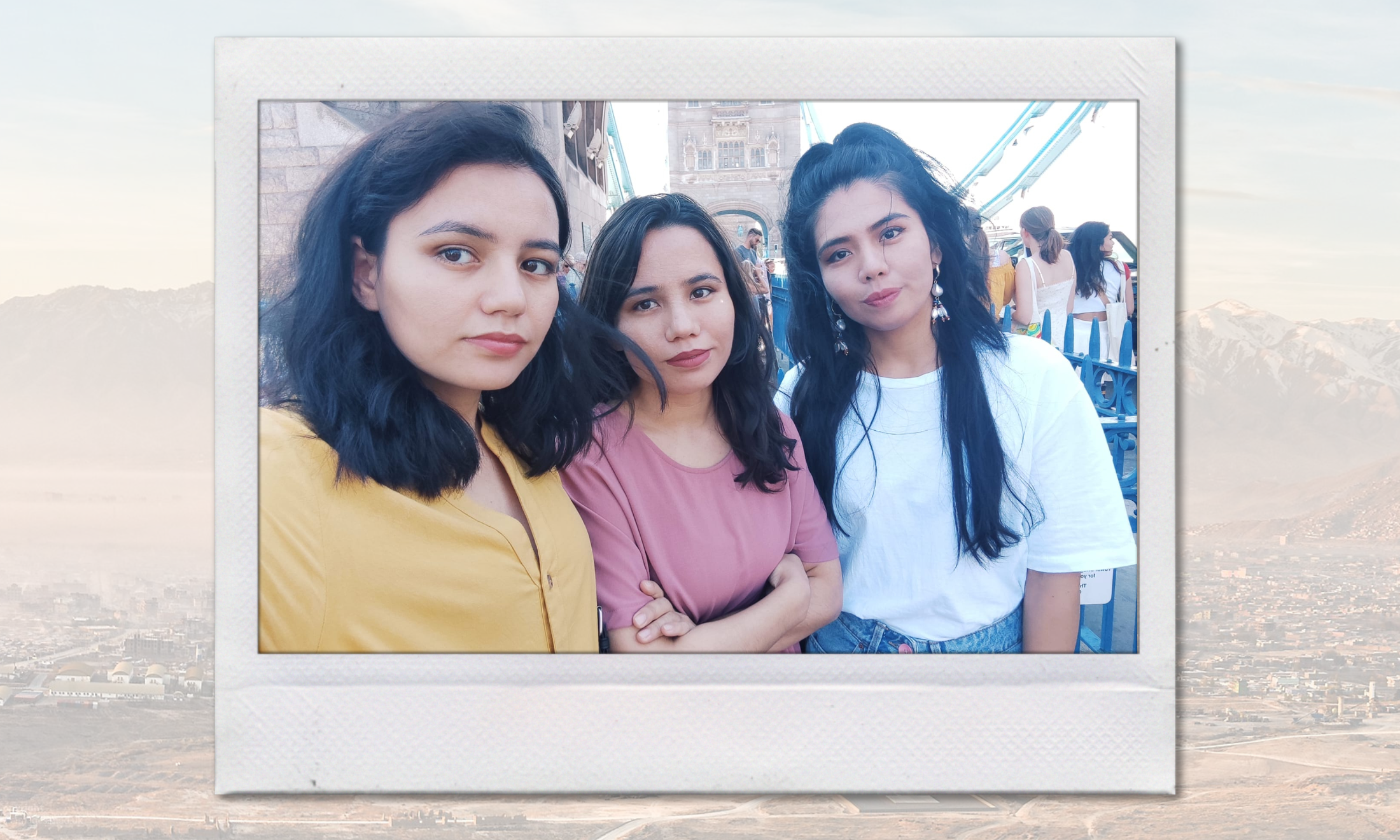Here’s what it was like to stop the Home Office deporting people in Glasgow
Being part of the protestors who stopped the detention of two men on Kenmure Street was lifechanging, but Glasgow organisers have been fighting this battle for years.
Adam Benmakhlouf
15 May 2021

Photography by Dale Harvey (@daleharvey)
It started with a group message. “Immigration raid happening in Kenmure Street now. Lots of folks taking photos and video. We need more people.” I quickly pulled on joggies and an anorak and made my way one neighbourhood over from mine, worried by the time I arrived it would be over and that the people would be on their way to detention and deportation.
I’ve lived in and around Glasgow for my entire life but it wasn’t until I was in my undergrad that I first learned about immigration raids while studying asylum law. They’re one of the most draconian hostile environment policies. As long as I’ve been conscious of the severe treatment of asylum seekers, I’ve been equally aware that there is an activist presence who consistently resist the injustices of Home Office decision-making. But I don’t think I’ve ever seen or heard of anything quite like what happened on Kenmure Street last Thursday.
The crowd was still thin when I arrived – there were around 60 people around the immigration enforcement van, which housed two men who had been forcibly removed from their family homes on the morning of Eid, one of the holiest days on the Muslim calendar. But, already out with bustcards (small pamphlets that list essential information and legal rights to protestors and migrants who are at risk of arrest) and taking notes as legal observers, I recognised some active organisers from local charities and organisations like Unity, who provide legal, social and personal support to those in the asylum system, and No Evictions, who support people in asylum accommodation in Glasgow against evictions.
They had put the word out and travelled over quickly – the tangible result of years of network building. By chance, some of them had trained with Haringey Anti-Raids the night before, which meant they had an understanding of how to mobilise the community in the exact situation that was playing out. The people with the greatest working knowledge spoke directly to the police officers, making straightforward requests for information and not accepting noncommittal responses. “Why are Police Scotland assisting with Home Office deportations?” one of the crowd called out. “We’re here to keep you safe,” an officer in the ring around the van said. “We’re safe,” we assured them.
“As long as I’ve been aware of the severe treatment of asylum seekers, I’ve been equally aware there is an activist presence who consistently resist the injustices of the Home Office”
It was true, with a glance I could spot at least 50 people I knew. I saw neighbours, colleagues, friends, crushes. I hadn’t felt so immersed in community in almost a year. All the chants were directed towards the police and the men themselves. Every time police opened the doors of the van, people would shout for the men to be released. The police seemed impassive. Hours passed like this, without a lull. The crowd expanded.
In the centre of the action, South East Asian women and girls were calling out to one another and waving. An older Glaswegian woman was there in a warm hooded jacket all day, cracking jokes and at one point producing bubble wrap scavenged from somewhere and passed it to the grateful protestor sitting at the foot of a policeman. People from the mosque carried huge multipacks of crisps and water. A young woman and her boyfriend shared their cigarettes with a young guy wearing a Tupac hat. We were in the centre of several areas in the city, some affluent, others experiencing multiple forms of deprivation, but making up for that day one neighbourhood on the street. It looked like a block party from some angles.

After a round of booing, word spread that three arrests were made. Grim predictions made early in the day of police provocation were confirmed, word spreading through the crowd of violence. I gripped my bike frame tighter, put my helmet on. Chants were almost continuous, with just enough rest for people to catch their breath. My ears popped sometimes as I tried to gulp in more air than was behind my mask between the shouts of “No borders! No nations! Stop deportations!” or “No justice! No Peace!!”
At around 5.30pm, after eight hours, lawyer Aamer Anwar announced that the men would be released. I’d left the spot I’d been in for seven hours just before, feeling that the crowd was dense and large enough for the moment. Like a lot of people on the ground that day, I had relied on a favour from a friend to balance care responsibilities with staying present through the day. But still, it was a wrench to leave.
“As soon as Lakhvir Singh set his eyes on the crowd he beamed like he’d just bumped into a gathering of several hundred of his closest friends”
Later, I heard about the outburst of emotion as the men were freed. The two men, Sumit Sehdevi, and Lakhvir Singh thanked the crowd for protecting “their own”. As soon as Lakhvir set his eyes on the crowd he beamed like he’d just bumped into a gathering of several hundred of his closest friends. All day, we’d been looking up to his family home, from where he’d been taken. His family came to the window to wave to the crowd, as hundreds of their neighbours made sure their brother, partner and son made it safely from the back of the immigration enforcement van to the mosque, where support was waiting to ensure he would receive formal legal protection. From what I heard, it was glorious – an exceptional climax. Any regrets about missing it are dampened by knowing I was there for as long as I was needed, even if not as long as I would have wanted to be.
It’s rare to have a moment like this, to see tangible results so clearly, and as a good news story, it was quickly played as a political football. Promises of the transformative effect of devolved competencies are still being bandied about. This advertised endgame of a more tolerant independent Scotland bears no resemblance to the situation for asylum seekers in Glasgow and everywhere – which has been awful for a long time.
While the party political rhetoric shifts and morphs, Glasgow organisers pragmatically continue the long history of grassroots organising that extends in large part from many generations of staunch working-class resistance. With asylum seekers facing the constant threat of death, destitution or deportation to warzones, the stakes are too high to divert energies anywhere except direct action and sustained challenge of barbarous Home Office policies. The working presumption of many activists and organisers is that until the nation-state and police are abolished, borders and deportations will continue to destroy lives.
Or, to put it as eloquently as the organisers, neighbours, friends, children and elders did on Thursday when they called out together: “No borders! No nations! Stop deportations!”
To find out more about immigration raids and how you can organise against them, visit Haringey Anti-Raids website and sign up to their anti-raids workshop









